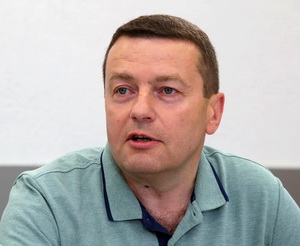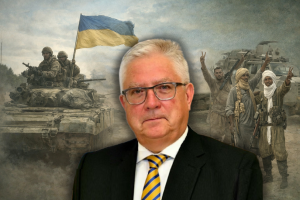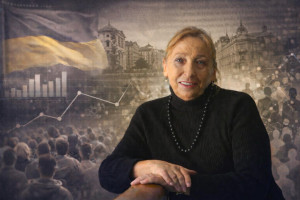
Oleksandr Reznik,
Doctor of Sociology, Head of the Department of Socio-Political Processes of the Institute of Sociology of the National Academy of Sciences of Ukraine, Head of the Center for Political Sociology
Democracy as a desirable ideal for the organization of the state system has become generally recognized in most countries. For the successful democratic transition of Eastern European countries, the geopolitical goal of integrating these societies into the European Union and NATO was important. However, the democratic transition of part of the post-communist countries encountered an influential obstacle – Putin’s Russia, which gradually has turned into a support of authoritarianism, a kind of gendarme in the post-Soviet space. In addition, in these countries, the protracted and long-term process of socio-economic transformations has led to the growth of authoritarian tendencies, especially among those social groups that suffer the most from these changes. The basis of authoritarian consciousness is the desire for a «strong hand», placing expectations and full responsibility on a certain official and deep distrust of democratic procedures for solving social problems, a negative attitude towards political parties and public associations. That is why the authoritarian consciousness flourishes under the conditions of high level of corruption and disregarding the law and laws, fueling by paternalistic orientations as the unequivocal placing of responsibility on the individual on the state in ensuring the population’s standard of living.
A number of methods are used in sociological surveys to identify support for democracy among the population. It can be an assessment of citizens’ satisfaction with the level of democracy, or an assessment of the existing political system’s conformity to democracy with the help of a scoring system, or an assessment by respondents of their ability to influence the government. All these indicators are of course important, but sometimes they can reflect the general state of mass consciousness, which often depends not on the real development of democracy, but mostly on the socio-economic situation.
The indicator, which was developed by the «Democratic Initiatives» Foundation, allows to reveal a more unequivocal answer regarding the preferences of citizens. In particular, the respondent is asked to decide on judgments that unequivocally indicate options for democratic or authoritarian governance. In addition, positions are added that reflect indifference or uncertainty about the issue. Since 2004, at the initiative of Iryna Bekeshkina, this indicator has been used mainly in surveys of the «Democratic Initiatives» Foundation, which makes it possible to trace the dynamics of the responses of the population of Ukraine (Table 1).
Table 1
Dynamics* of Ukrainian citizens’ answers to the question «Which of the following judgments do you agree with the most?», %
Judgments about the state system | May 2004 | June 2006 | October 2006 | June 2007 | December 2008 | April 2009 | October 2010 | April 2012 | March 2013 | August 2016 | July- August 2021 | August 2022 |
Democracy is the most desirable type of government for Ukraine | 41,3 | 52,1 | 53,5 | 42,8 | 37,9 | 32,2 | 46,9 | 50,9 | 47,9 | 54,0 | 54,0 | 63,9 |
Under certain circumstances, an authoritarian regime can be better than a democratic one | 23,2 | 20,8 | 21,5 | 21,5 | 18,6 | 17,4 | 19,1 | 19,6 | 22,5 | 19,8 | 19,6 | 13,8 |
For a person like me, it does not matter whether the country is democratic or not | 18,0 | 13,3 | 10,9 | 17,7 | 19,6 | 24,9 | 15,7 | 18,3 | 16,7 | 15,0 | 16,7 | 13,1 |
Difficult to answer | 17,5 | 13,8 | 14,0 | 18,0 | 17,8 | 25,5 | 18,3 | 11,2 | 12,9 | 11,1 | 9,7 | 9,2 |
TOTAL | 100,0 | 100,0 | 100,0 | 100,0 | 100,0 | 100,0 | 100,0 | 100,0 | 100,0 | 100,0 | 100,0 | 100,0 |
* May 2004 – the survey was conducted by the «Democratic Initiatives» Foundation together with the «Social Monitoring» Center for the implementation of the «State of Democracy in Ukraine» project (N=2038). In 2006, surveys were conducted by the Democratic Initiatives Foundation and the Ukrainian Sociological Service firm in June and October (N=2011). December 2008 – the survey was conducted by the «Democratic Initiatives» Foundation and the «Ukrainian Sociological Service» firm (N=2012). April 2009 – the survey was conducted by the Institute of Sociology of the National Academy of Sciences of Ukraine and the «Socis company» (N=1800). October 2010 – the survey was conducted by the Foundation «Democratic Initiatives» and the firm «Ukrainian Sociological Service» (N=2011). April 2012 – the survey was conducted by the «Democratic Initiatives» Foundation and the Razumkov Center (N=2009). March 2013 – the survey was conducted by the «Democratic Initiatives» Foundation and KMIS (N=2037). August 2016 – the survey was conducted by the Democratic Initiatives Foundation and KMIS (N=2040). July-August 2021 – the survey was conducted by the «Democratic Initiatives» Foundation and the Razumkov Center (N=2019). August 2022 – the survey was conducted by the «Democratic Initiatives» Foundation and the Razumkov Center (N=2024).
This dynamic testifies to the connection of the mass consciousness with the socio-economic and political processes that have continued up to that time. In particular, a noticeable increase in support for democratic governance occurred after the Orange Revolution. However, in subsequent years there was a political crisis associated with the inconsistency of the powers of the legislative and executive branches of government. The election of the parliament in 2006 and the formation of a coalition that started a confrontation with the president led, in fact, to dual power. The adoption of a new edition of the «The Law on the Cabinet of Ministers», which gave more powers to the government, and the mass transition of opposition deputies to the parliamentary majority, which could since then reach constitutional proportions (300 people’s deputies) and overcome presidential vetoes, forced President Victor Yushchenko in spring of 2007 to dissolve the Verkhovna Rada. Parliament and the government considered this move unconstitutional and sabotaged the first dates of early elections. Only certain steps of the president, in particular the direct subordination of internal troops, changed the nature of the confrontation and stimulated the negotiation process, which culminated in the holding of early parliamentary elections in September 2007. Public opinion reacted to this by decreasing support for democracy and increasing indifference.
In addition, the subsequent global financial and economic crisis of 2008 resulted in a sharp devaluation of the national currency for Ukraine. The 2009 survey showed minimal support for democratic governance, when less than a third of respondents believed that democracy was the most desirable type of government for Ukraine. Instead, the number of uncertain and indifferent positions increased. Iryna Bekeshkina paid attention to this at the time, noting that the decrease in support for the democratic state system does not lead to an increase in the number of supporters of authoritarianism; those who are disillusioned with democracy move into the category of those who do not care what political regime will be in the country. However, at the same time, she recorded the key fact that the correlations between foreign policy orientations and the choice of the type of political regime turned out to be much closer than between the sense of economic crisis and the choice of a political regime. Democracy was chosen primarily by those who would prefer Ukraine to join the European community and NATO and not join the alliance with Russia and Belarus. On the other hand, it was important that even those who were oriented towards an alliance with Russia and Belarus were not inclined to adopt for Ukraine the political regime that prevailed in these countries; a significant number of these respondents’ showed indifference to the type of political regime [Bekeshkina, 2009].
Even after the authoritarian president Victor Yanukovych came to power, the population gradually recovered from the political disturbances and economic crisis, so support for democracy increased to almost half of the population. And only after the Revolution of Dignity did this indicator strengthen.
With the beginning of a full-scale Russian invasion of Ukraine in 2022, it was expected that against the background of martial law, centralization of power and mass rallying around political leaders, public demand for an authoritarian system would grow. However, the results of the 2022 survey, on the contrary, indicate greater support for the democratic system and a decrease in support for authoritarianism.
Therefore, there was a need to analyze respondents’ answers according to socio-demographic indicators for a detailed understanding of which preferences regarding the desired state system are widespread in different social groups of the population of Ukraine. For this purpose, the results of a sociological survey conducted by the Ilko Kucheriv Foundation «Democratic Initiatives» with the sociological service of the Razumkov Center from August 5 to 12, 2022 with the grant support of the University of Bremen and the International Renaissance Foundation were used. The face-to-face survey was conducted in Vinnytsia, Volyn, Dnipropetrovsk, Zhytomyr, Zakarpattia, Zaporizhia, Ivano-Frankivsk, Kyiv, Kirovohrad, Lviv, Mykolaiv, Odesa, Poltava, Rivne, Sumy, Ternopil, Kharkiv, Khmelnytskyi, Cherkasy, Chernihiv, Chernivtsi regions and the city of Kyiv (in the Zaporizhzhia, Mykolaiv, Kharkiv regions – only in those territories controlled by the government of Ukraine and in which hostilities are not taking place). 2024 respondents over the age of 18 were interviewed. The theoretical sampling error does not exceed 2.3%. At the same time, additional systematic deviations of the sample may be caused by the consequences of Russian aggression, in particular, the forced evacuation of millions of citizens.
Age characteristics of political orientations depend on the conditions under which primary and secondary socialization took place. Along with primary socialization, in which the immediate environment (family, acquaintances, friends, school) plays a key role starting from childhood, the formation of an individual in his civil status takes place under the influence of a set of political and social institutions that become key during secondary socialization. This is why citizens who live in cultures with long experience of democratic governance will show a more positive attitude towards how democracy works than the public who grew up under autocracy.
In this case, the personality is influenced not only by political factors, which are of primary importance, but also by non-political conditions under which human socialization takes place. Moreover, the presence of agents and institutions of socialization ensures the existence of an individual as a citizen. The absence of these determinants leads to tragic consequences. A vivid example is the work of the British novelist William Golding «Lord of the Flies». English boys, who ended up on a deserted island after a plane crash, try to organize a certain social organization on the model of the state they left. Their system has signs of democracy. But later, terrible events happen to the boys, who at first cheerfully set out to build their society and democratically choose a leader. Democracy turns into the totalitarian rule of a self-appointed leader, a civilized community turns into a tribe, and its members into savages.
That is why the ongoing crisis of political socialization in Ukraine and other post-Soviet countries affects the older age group the most, which is much worse at adapting and resocializing under new political conditions. This is due to the fact that the new democratic values have not acquired sufficient systematization, have not been supported economically, so this group finds and returns the usual former political values in order to reduce the feeling of uncertainty and anxiety.
The age distribution of respondents’ answers in the 2022 survey confirms this trend (Table 2). The youngest group (18–29 years old) of Ukrainian citizens most supports the opinion that democracy is the desired type of government for Ukraine. However, older youth and middle-aged people are not far behind the youngest. And this is not surprising, since people from the 50-59-year-old generation, among which two-thirds now support the democratic system, were 20-30 years old thirty years ago. That is, already during the years of Ukraine's independence, their secondary political socialization took place.
Table 2
Age distribution of responses of Ukrainian citizens to the question «Which of the following statements do you agree with the most?», %
Judgments about the state system | 18-29 years | 30-39 years | 40-49 years | 50-59 years | 60 years and older |
Democracy is the most desirable type of government for Ukraine | 71,4 | 67,5 | 64,4 | 66,4 | 55,6 |
Under certain circumstances, an authoritarian regime can be better than a democratic one | 9,3 | 13,8 | 14,3 | 12,3 | 16,8 |
For a person like me, it does not matter whether the country is democratic or not | 10,9 | 9,5 | 10,8 | 12,3 | 19,0 |
Difficult to answer | 8,4 | 9,2 | 10,5 | 9,0 | 8,7 |
TOTAL | 100,0 | 100,0 | 100,0 | 100,0 | 100,0 |
The level of education as a factor of attitude towards the state system is also important. After all, it depends on both the cognitive skills of information selection and the choice of information sources themselves, from which individuals draw knowledge about the advantages or disadvantages of a certain ideology or a certain political regime. As a rule, people with a higher level of education are not limited to television, but often look for answers to questions from various Internet sources. In addition, during secondary socialization, they more carefully mastered elementary socio-humanitarian knowledge (history, political science, sociology, etc.), which play a certain role in the education of liberal views. This gives them a clearer knowledge of the benefits of democracy and the dangers of authoritarianism.
So, the 2022 survey shows a clear trend, when agreement with the advantages of the country’s democratic system increases with the increase in the level of education (Table 3).
Table 3
Educational distribution of responses of Ukrainian citizens to the question «Which of the following statements do you agree with the most?», %
Judgments about the state system | General secondary | Secondary special | Higher or unfinished higher |
Democracy is the most desirable type of government for Ukraine | 56,6 | 62,8 | 70,4 |
Under certain circumstances, an authoritarian regime can be better than a democratic one | 14,0 | 12,1 | 15,2 |
For a person like me, it does not matter whether the country is democratic or not | 19,6 | 13,2 | 8,9 |
Difficult to answer | 9,8 | 11,9 | 5,5 |
TOTAL | 100,0 | 100,0 | 100,0 |
Curiously, the research recorded differences between people with general secondary education and secondary special education. It is obvious that additional education after general education gives a clearer understanding of the advantages of a democratic system. Actually, there is nothing surprising in this, since the support of democracy in developed countries is based on the existence of a powerful middle class, whose representatives do not necessarily musthave a higher education. Rather, it is about the fact that the level of education combined with the material situation are components of the socio-economic status of an individual. Sociological researches indicate that with increasing socio-economic status, support for democratic governance increases. After all, with the growth of the material situation, which often depends on the level of education, people are freed from the existential pressure of survival problems, accordingly, for such people, the usefulness and value of freedom is significantly expressed. In turn, this leads to requests and aspirations that can best be realized by liberal-democratic institutions.
Often the economic factor becomes decisive in the processes of democratization, especially when financial and economic crises intensify. A sharp deterioration in the economic situation, a drop in the standard of living, an increase in unemployment and other negative consequences cause the population to yearn for a «strong hand», contribute to the curtailment of democratic freedoms and the development of authoritarian tendencies. In addition, impoverished voters have a short memory and can be tempted by populist or authoritarian slogans, since impoverished citizens do not have access to thorough knowledge of the political system, they get information mainly from television. Such people who become victims of political charlatans, populists and those who give simple recipes for solving complex problems. People of low socio-economic status tend to be preoccupied with problems of survival, so they cannot appreciate the existence of democratic institutions, except those that distribute financial aid.
The wealthy have more rational views on political issues than the average voter because they are aware of their interests. With the achievement of a certain material wealth, people have free time, motivation and the ability to pursue democratic freedoms. And it is the democratic system with its shortcomings that helps realize these interests. For many financially well-off citizens (at least for those who have achieved their status on their own), a realistic assessment of the consequences of a certain political governance is part of their self-esteem as people who must understand the subtleties of politics, because the preservation of the achieved status depends on it. Actually, their sensitive response to the possibility of authoritarian rule is due to the acquired understanding of the reasons for their own successes and failures in career or business. After all, wealthier people tend to prefer democracy and its institutional constraints as barriers against the predatory potential of the state, especially in transitional democracies.
Ukrainian citizens are no exception. The 2022 survey showed a clear trend of increasing support for the democratic system in Ukraine with increasing financial status (Table 4). Accordingly, indifference and indifference to the content of political governance decreases with the growth of the material situation. It is compelling that the orientation towards an authoritarian regime has no connection with material status.
Table 4
Distribution of Ukrainian citizens’ answers to the question «Which of the following statements do you agree with the most?» by assessment of financial situation, %
Judgments about the state system | Extremely poor | Poor | Wealthy enough | Wealthy |
Democracy is the most desirable type of government for Ukraine | 52,9 | 62,9 | 67,4 | 71,7 |
Under certain circumstances, an authoritarian regime can be better than a democratic one | 14,6 | 13,9 | 13,6 | 12,4 |
For a person like me, it does not matter whether the country is democratic or not | 20,4 | 13,5 | 11,2 | 9,0 |
Difficult to answer | 12,0 | 9,8 | 7,9 | 6,9 |
TOTAL | 100,0 | 100,0 | 100,0 | 100,0 |
Other traditional factors that over the decades determined the political orientations of Ukrainians were their ethno-cultural and regional characteristics. Since the early Middle Ages, the modern territories of the West and Center of Ukraine have been under the control of European state entities, namely Kievan Rus, founded by the Scandinavian dynasty, the Grand Duchy of Lithuania, the Polish-Lithuanian Commonwealth, the Cossack Republic (Hetmanate), the Austro-Hungarian Empire, Poland, Romania, and Czechoslovakia. In these areas, the existence of a long tradition of monopoly on power was impossible, since various external subjects often changed the political ownership of the lands. This created a negative attitude of Ukrainians towards state institutions, which became a problem in the future for the formation of their own statehood. On the other hand, the tradition of church brotherhoods, universities and craft workshops in these areas was a certain historical prototype of civil autonomy from the political regime. Instead, the long stay of the eastern and southern parts of Ukraine under the rule of the Russian monarchs and the Soviet Union caused significant Russification both through cultural influence and through migration processes, urbanization, as ethnic Russians were resettled here en masse. Therefore, in the Western and Central macro-regions, people mostly spoke Ukrainian, and in the Southern and Eastern macro-regions, especially in large cities, they spoke Russian. As a result, manifestations of political polarization were observed until recently, when electoral differences based on language and regional characteristics were recorded in the presidential and parliamentary elections.
With the beginning of the great war, most of the regional and linguistic differences in the political attitudes of Ukrainians were almost eliminated, especially with regard to geopolitical and security orientations. However, if we analyze the results of the survey in 2022 according to the language of communication at home, we can notice certain differences (Table 5).
Table 5
Distribution of Ukrainian citizens’ answers to the question «Which of the following statements do you agree with the most?» by language of communication at home, %
Judgments about the state system | Ukrainian | Russian |
Democracy is the most desirable type of government for Ukraine | 66,2 | 59,6 |
Under certain circumstances, an authoritarian regime can be better than a democratic one | 12,3 | 16,6 |
For a person like me, it does not matter whether the country is democratic or not | 13,0 | 13,3 |
Difficult to answer | 8,4 | 10,5 |
TOTAL | 100,0 | 100,0 |
Among Ukrainian-speakers, a slightly higher share of support for a democratic system was recorded than among Russian-speakers, although in general, support for democracy dominates in both language groups. At the same time, it should be noted that there are no significant linguistic differences in the choice of an authoritarian government under certain circumstances.
In a similar way, differences in macro-regional distribution are preserved (Table 6). Larger shares of support for a democratic system – about two thirds – are declared by respondents in the Western and Central macro-regions, while in the Southern and Eastern macro-regions – such respondents are more than half of the respondents, which is also a significant result of changes in mass consciousness.
Table 6
Macro-regional distribution of responses of Ukrainian citizens to the question «Which of the following statements do you agree with the most?», %
Judgments about the state system | West | Centre | South | East |
Democracy is the most desirable type of government for Ukraine | 65,7 | 68,3 | 56,7 | 56,3 |
Under certain circumstances, an authoritarian regime can be better than a democratic one | 11,9 | 13,2 | 17,2 | 15,9 |
For a person like me, it does not matter whether the country is democratic or not | 12,8 | 10,7 | 17,2 | 16,3 |
Difficult to answer | 9,5 | 7,8 | 8,9 | 11,5 |
TOTAL | 100,0 | 100,0 | 100,0 | 100,0 |
Therefore, the analysis of the preferences of Ukrainians regarding the desired state system during a full-scale war inspires hope, as a noticeable increase in the number of citizens who are oriented towards democratic governance has been revealed. However, this optimism is more cautious than definitive. It should be taken into account that the 2022 survey was conducted during martial law, when political life was not updated, and the occupied territories of Ukraine were not covered. In addition, the socio-demographic characteristics of the respondents’ answers indicate the existence of differences in terms of age, education, financial situation, language, and regions.
It is obvious that the vestiges of linguistic and macro-regional divisions, although they were suppressed by the war, nevertheless, their existence has not completely disappeared and may show signs during the post-war political process. Based on the fact that post-war reconstruction will certainly actualize the feeling of impoverishment and exacerbate social discontent, the temptation of simple political solutions, which are not burdened by the complex procedures of representative democracy, can be supported by a stratum of people with a low socio-economic status. And the number of such people may be decisive for a certain time due to the demographic imbalance that occurred due to the forced departure of mostly representatives of the middle classes to the countries of the European Union.
However, we should remember the words of Iryna Bekeshkina, who thirteen years ago urged not to exaggerate the impact of economic troubles on the processes of democratization of Ukrainian society: «Let's conclude: the economic factor is indeed influential in people’s commitment to democracy, but not decisive. Decisive for the fate of democracy in Ukraine is the general vision of its future - as a democratic, prosperous European state, where human rights are respected and where citizens are able to really influence the actions of the government. In our opinion, the support of democracy in Ukraine should, first of all, consist in giving Ukraine the prospect of EU membership, spreading European values in the public consciousness, of which democracy is an integral component, bringing to the Ukrainian community the understanding that democracy is better and, most importantly, economic problems are solved more fairly in relation to citizens» [Bekeshkina, 2009: p. 356]. Currently, the war has made the Euro-Atlantic choice unalternative for Ukrainian citizens, and this can become a guarantee of Ukraine’s post-war democratization.
Sources:
Bekeshkina, I. (2009). Exam for democracy. In: V. Vorona, M. Shulga (eds.) Ukrainian society 1992–2009. Dynamics of social changes (pp. 348–357). Kyiv: Institute of Sociology of the National Academy of Sciences of Ukraine.








